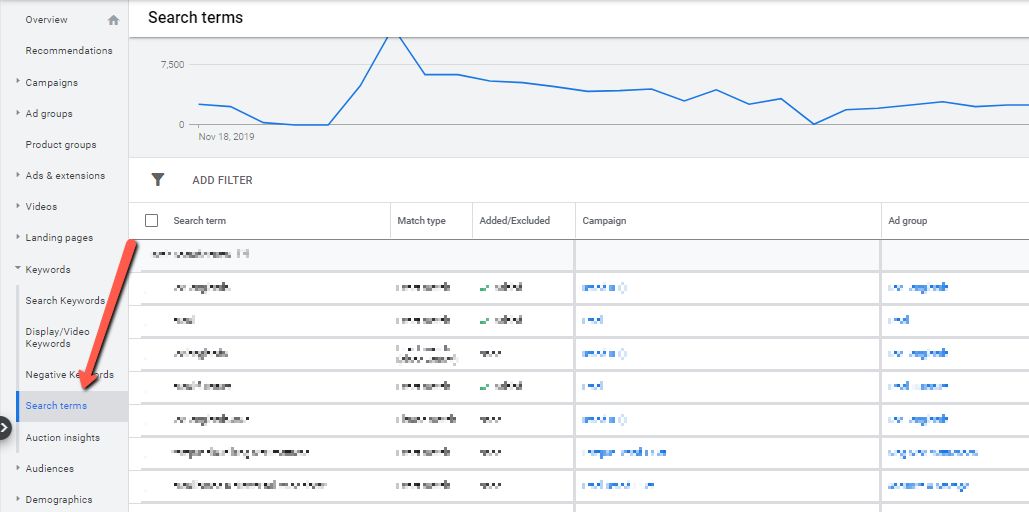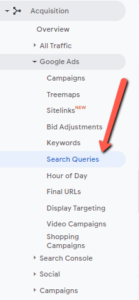I’m sure by now you’re aware of the recent search term update by Google which went live at the beginning of September. However let’s have a quick recap;
“Starting September 2020, the search terms report only includes terms that a significant number of users searched for, even if a term received a click. You may now see fewer terms in your report.”
What does this mean though? Well basically, anybody who is currently managing any paid search through Google Ads will begin to lose control on where their ad spend is going. We now have less data to be able to see what search queries have triggered ads, even if they convert.
Supposedly Google have brought this change upon advertisers to “maintain our standards of privacy and strengthen our protections around user data”. To be perfectly honest, this is hard to believe. Especially when we still see sensitive information searches or even advertisers in the United States able to relisten to Call from Ad conversations.
This more falls in line with Google’s parent company Alphabet seeing a revenue decline of around $2.6 billion during Q2, so a quick way to rebuild this profit stream is to throw the blinders on at advertisers and encourage more spending which the bigger advertisers will, and ultimately see SMBs suffer hugely. Moving on…
What are search terms and what is this update?
Search terms ultimately are the exact query a user has searched and that has triggered your ad. Advertisers have utilised the search term report to mine negative keywords, write ad copy with relevant queries, run Ngram analysis’s to find profitable keyword variations and basically figure out how their target audience searches.

The update from big G basically takes a good proportion of this data away from advertisers to leave them to put their finger up in the air and take a good guess (don’t actually do this..), aka line their pockets with more advertising revenue.
Is this really an issue though?
The update hasn’t been welcomed by most to be honest, however it also wasn’t a shock Google have sprung this upon advertisers. Mid 2019 we saw the metric Average Position sunsetted, along with Accelerated Delivery (who used this anyway..?) and the constant loosening of close variants, the Search Term loss was kind of foreseeable.
Some may say this actually isn’t a big deal though. If your account is built out smartly, with tight-knit adgroups and a proper negative keyword strategy, what’s to lose here?
Well technically, not a lot. However I’d be willing to put money on that the majority of accounts aren’t up to scratch, still need proper organising and constant search term refinement. This is who will see the biggest effect of the update.
SMBs and newer advertisers, or even mature accounts trying to scale will see a blurred picture of their true account performance. Only the huge advertisers with (pretty much) endless budgets will be able to properly wake this.
What we’ve seen
The hardest hit industries have easily been the SaaS markets. The search queries from users are very diverse, and this is where Google has seen big fat $$$s.
For example, in one of our SaaS clients who are looking to generate leads. It’s common to see ridiculously high cost per clicks north of £50 which is industry standard and can be very sensitive at times. Looking at the same time period in 2019 compared to 2020, we have seen around 58% of search term spend being hidden, in comparison to 2019 which saw around 2%. This can of course quickly rack up a leakage in ad spend.
Across other advertisers whether it be eCommerce, lead generation in more common markets or DTC verticals, we are seeing just over 30% loss of search term spend despite having tight-knit structures and thorough negative lists built out.
What does not completely make sense though is seeing conversions being hidden. This kind of defeats the purpose from Google. Wouldn’t they want to encourage us to know what terms are converting and can start pumping more budget into it?
What can you do?
Albeit losing search term visibility sucks, we must continue managing our clients account, optimising where we can and deploying strategies to generate a return. There are a few areas you should consider though moving forward.
Dive into the search queries in Google Analytics
Jump into your GA account and click Acquisition > Google Ads > Search Queries then set your date range. You’ll then want to export this data to Google Sheets or Excel. Head back over to your Ads account and do the same for your search term report for the same date.

You’ll now want to do a quick VLOOKUP across both data sets. See any N/As from your Analytics data? There ya go! This will be a good portion of missing search terms that are hidden in your Google Ads account. I don’t believe this workaround will be around for long though..
Revisit your match type strategy
With the constant updates to close variant updates, you should have this on your agenda already. Exact matches are now basically working like Phrase match (except word order) and Phrase are pretty much Broad Match now.
Start to simplify your account and just focus on Exact Match and Broad Match Modified to prelimit any irrelevant searches.
Get your negatives in order
The best approach to your negative keyword strategy is to be as literal as possible. We would actually recommend prioritising this as much as your actual keyword generation for prospecting. You may think Google won’t match search terms with ridiculous terms but trust us, they will. Be literal, include every variation that is irrelevant, and order these by using negative keyword lists. There is honestly nothing more mind numbing than having to skim through thousands of negative keywords added directly to campaigns/ad groups over the years. Make it easy for yourself!
Leveraging Dynamic Search Ads? Rethink these..
We’ve seen great success with DSA campaigns, mostly in eCommerce clients. They are a great tool for mining, and filling in any keyword gaps within your search campaigns. However paired with the search term updates, this is also quite a quick-fire way to eat through your daily budget.
For now, we have paused all of our DSA campaigns to regain some sort of control.
Consider testing Smart Bidding
Yes this seems completely contradictory, bowing down before Google’s automation and removing our levers.. however this makes complete sense. Smart bidding can bid on a search term level with tons of data signals factored in and to be honest we’ve seen awesome results by leveraging it. Check it out here. Trust that Google will still let its own smart bidding algorithm access all the data, cause if that doesn’t work, well what kind of business model is that?
Dial the Bing helpline
If your campaigns are mirrored over to Bing, jump into your search terms there and find any irrelevant queries that can be blocked across both search engines. Not advertising there? This could be a good time to test!
Wrap-up
So far 2020 has been a bit of a wild ride, not even from a PPC perspective! However we must continue to adapt to areas we cannot control. If you need some support or even just a general chit-chat over the lack of transparency we are now seeing within Paid Media, do get in touch!
